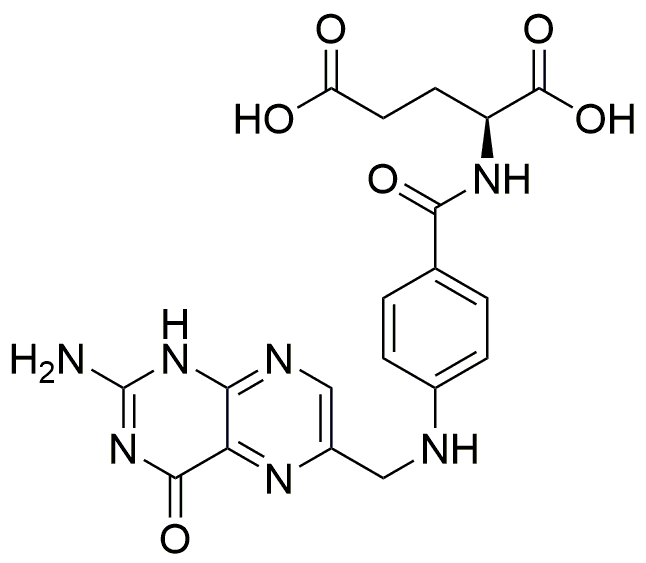Folic acid is widely utilized in research focused on:
- Nutritional Supplements: Commonly found in multivitamins, it supports prenatal health by reducing the risk of neural tube defects in developing fetuses.
- Food Fortification: Added to cereals and bread to prevent folate deficiency in populations, enhancing overall public health.
- Pharmaceuticals: Used in the treatment of certain types of anemia and as part of chemotherapy regimens to mitigate side effects in cancer patients.
- Research in Genetics: Investigated for its role in DNA synthesis and repair, providing insights into genetic disorders and potential therapies.
- Cardiovascular Health: Studied for its ability to lower homocysteine levels, which may reduce the risk of heart disease.
Informations générales
Propriétés
Sécurité et réglementation
Applications
Folic acid is widely utilized in research focused on:
- Nutritional Supplements: Commonly found in multivitamins, it supports prenatal health by reducing the risk of neural tube defects in developing fetuses.
- Food Fortification: Added to cereals and bread to prevent folate deficiency in populations, enhancing overall public health.
- Pharmaceuticals: Used in the treatment of certain types of anemia and as part of chemotherapy regimens to mitigate side effects in cancer patients.
- Research in Genetics: Investigated for its role in DNA synthesis and repair, providing insights into genetic disorders and potential therapies.
- Cardiovascular Health: Studied for its ability to lower homocysteine levels, which may reduce the risk of heart disease.
Documents
Fiches de données de sécurité (FDS)
La FDS fournit des informations de sécurité complètes sur la manipulation, le stockage et l’élimination du produit.
Spécifications du produit (PS)
Le PS fournit une description complète des propriétés du produit, notamment sa composition chimique, son état physique, sa pureté et les exigences de stockage. Il détaille également les plages de qualité acceptables et les applications prévues du produit.
Certificats d'analyse (COA)
Recherchez des certificats d'analyse (COA) en saisissant le numéro de lot du produit. Les numéros de lot et de lot se trouvent sur l'étiquette d'un produit, après les mots « Lot » ou « Lot de fabrication ».
Numéro de catalogue
Numéro de lot/série
Certificats d'origine (COO)
Ce certificat d'exploitation confirme le pays dans lequel le produit a été fabriqué, et détaille également les matériaux et composants utilisés et s'il est issu de sources naturelles, synthétiques ou autres sources spécifiques. Ce certificat peut être requis pour les douanes, le commerce et la conformité réglementaire.
Numéro de catalogue
Numéro de lot/série
Fiches de données de sécurité (FDS)
La FDS fournit des informations de sécurité complètes sur la manipulation, le stockage et l’élimination du produit.
DownloadSpécifications du produit (PS)
Le PS fournit une description complète des propriétés du produit, notamment sa composition chimique, son état physique, sa pureté et les exigences de stockage. Il détaille également les plages de qualité acceptables et les applications prévues du produit.
DownloadCertificats d'analyse (COA)
Recherchez des certificats d'analyse (COA) en saisissant le numéro de lot du produit. Les numéros de lot et de lot se trouvent sur l'étiquette d'un produit, après les mots « Lot » ou « Lot de fabrication ».
Numéro de catalogue
Numéro de lot/série
Certificats d'origine (COO)
Ce certificat d'exploitation confirme le pays dans lequel le produit a été fabriqué, et détaille également les matériaux et composants utilisés et s'il est issu de sources naturelles, synthétiques ou autres sources spécifiques. Ce certificat peut être requis pour les douanes, le commerce et la conformité réglementaire.


